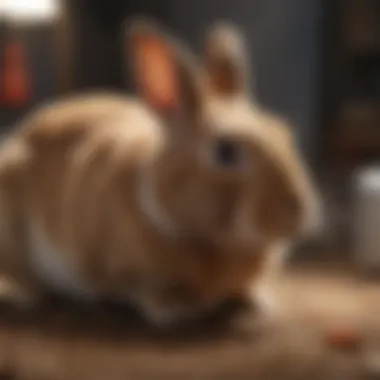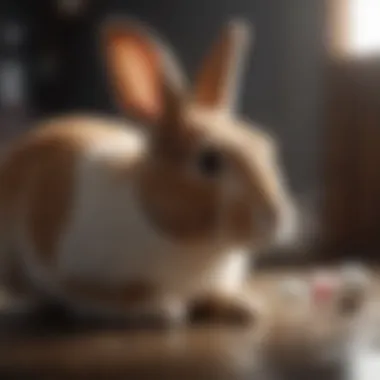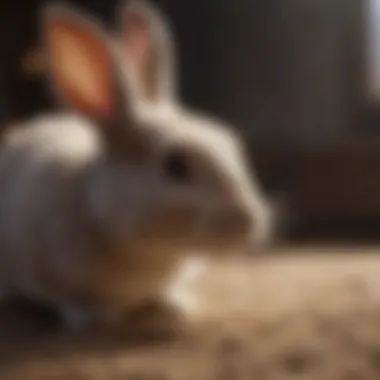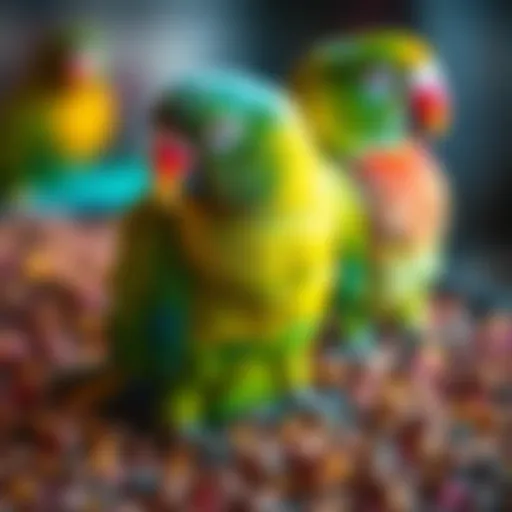Capstar for Rabbits: Effective Flea Treatment Guide


Intro
Flea infestations pose significant health risks to rabbits. Understanding the correct treatment options is essential for any responsible pet owner. Capstar, a well-known oral flea treatment, is increasingly being considered for rabbits' management of fleas. This guide explores its efficacy, safety, and application methods, providing crucial insights for rabbit owners.
Understanding Your Pet
Understanding a rabbit's unique needs and behaviors is vital in treating health issues effectively. Rabbits are sensitive creatures, and their specific characteristics can influence how they respond to treatments like Capstar.
Pet Behavior Basics
Rabbits exhibit distinct behavioral patterns. They are social animals and prefer companionship, whether with other rabbits or human families. Sudden changes in their behavior, such as increased hiding or inactivity, can signal discomfort or illness. Awareness of these signs is critical when assessing health, especially regarding flea infestations.
Common Breed Characteristics
Different breeds may have varied susceptibilities to flea infestations and may react differently to treatments. Breeds like the Holland Lop or Mini Rex are popular but have unique fur textures which can trap fleas more easily. Thus, knowing your rabbit's breed can help in understanding their specific needs when using products like Capstar.
Species-Specific Needs
Rabbits have unique dietary and environmental needs. A comprehensive understanding of what they require can lead to better overall health. Capstar should be used in conjunction with good care practices to ensure that rabbits do not just survive, but thrive.
Pet Care and Maintenance
Proper maintenance is key to ensuring your rabbit’s health, especially during flea seasons.
Feeding Guidelines
A balanced diet comprised of hay, fresh vegetables, and a small amount of pellets is critical. A healthy rabbit is more resilient to illnesses and infestations, making effective flea treatments like Capstar more successful.
Grooming Essentials
Regular grooming helps in preventing flea infestations. Brushing your rabbit can reduce the likelihood of fleas taking hold and also promotes a bond between the pet and owner. It is also an opportunity to check for any signs of fleas or skin issues.
Hygiene Practices
Maintaining a clean living environment can help in reducing flea populations. Regularly changing bedding, cleaning litter boxes, and vacuuming your home will minimize the chances of infestations. Consistent hygiene practices complement treatments like Capstar effectively.
Health and Wellness
Routine health checks play a significant role in your rabbit's overall well-being.
Routine Vet Check-ups
Schedule regular veterinary visits to ensure your rabbit maintains good health. A vet can provide advice regarding flea treatments, including the appropriate use of Capstar.
Vaccination Needs
Vaccinations are critical for preventing diseases that could compromise a rabbit’s health. A healthy rabbit is less vulnerable to flea infestations, necessitating treatments like Capstar.
Recognizing Signs of Illness
Identifying symptoms of illness early is crucial. Signs such as weight loss, lack of appetite, or unusual behavior can indicate further health issues, necessitating immediate veterinary consultation.
Enrichment and Activities
Engaging your rabbit in regular activities can also aid in maintaining their health.
Indoor vs.
Outdoor Activities
Both indoor and outdoor activities help keep a rabbit physically and mentally stimulated. Ensure outdoor experiences are safe from fleas and other parasites.
Interactive Toys and Games
Provide toys that encourage physical activity and mental engagement. These activities promote a healthier lifestyle and can deter boredom-related behaviors which might lead to health issues.


Socialization Opportunities
Regular interaction with other rabbits, or pets, can enhance your rabbit's social skills. This companionship can aid mental well-being, making them less susceptible to health issues, including those requiring treatments like Capstar.
Understanding how to care for your rabbit holistically will complement any medical treatments you provide, including Capstar.
The discussion surrounding Capstar for rabbits emphasizes the importance of insightful care and treatment approaches. By recognizing your rabbit's behaviors and needs, pet owners can optimally apply treatments and maintain overall health.
Prelims to Capstar
Understanding Capstar is crucial for rabbit owners. Flea infestations can lead to severe health issues in rabbits. Therefore, having effective treatments like Capstar makes a significant difference. This section will provide essential insights into what Capstar is and its common applications.
What is Capstar?
Capstar is a veterinary medication used to treat flea infestations in various animals, including rabbits. The active ingredient in Capstar is nitenpyram, a fast-acting insecticide that targets adult fleas. Unlike some other treatments that take time to work, Capstar begins to kill fleas within 30 minutes of administration. This immediate action can be vital for rabbits suffering from discomfort due to flea bites.
Veterinarians often recommend Capstar because it has a good safety profile when used according to guidelines. Its quick effectiveness can provide relief to rabbits in distress, making the overall care process easier for pet owners.
Common Uses of Capstar
Capstar is primarily used for the rapid elimination of fleas in rabbits. Here are some common uses:
- Immediate Treatment: It is often the first choice for quick relief from flea infestations.
- Combination Therapy: Sometimes used alongside other treatments, such as topical medications, for comprehensive flea control.
- Traveling Pets: Capstar can be helpful for rabbits being taken on trips where flea exposure might occur.
In summary, Capstar is a vital tool for managing fleas in rabbits. Its quick action and wide acceptance among veterinarians make it a go-to option for many pet owners. Understanding these aspects can help you make informed decisions about your rabbit's health and welfare.
Understanding Flea Infestations in Rabbits
Flea infestations present a significant concern for rabbit owners. Understanding this topic is crucial not only for the health of the pet but also for the overall household environment. Rabbits, while adorable and gentle, can succumb to fleas easily. This makes it imperative for owners to recognize the signs and potential repercussions of these infestations.
Fleas can quickly multiply, leading to severe discomfort and health issues for rabbits. Furthermore, they can also infect humans and other pets in the home. Recognizing the early symptoms can help take necessary measures before the situation escalates. By exploring this area, rabbit owners become equipped to maintain a healthy and safe environment for their pets, while preventing further complications.
Signs of Flea Infestation
Rabbit owners should be vigilant in observing their pets for any signs that may indicate a flea infestation. Some common signs include:
- Excessive Scratching or Grooming: If you notice your rabbit scratching more than usual, this is often a clear indication of fleas.
- Hair Loss: Fleas can cause bald patches or thinning fur due to consistent scratching.
- Flea Dirt: This is the feces left by fleas. It often appears as tiny black specks on the fur or in the living area of the rabbit. You can check for flea dirt by rubbing a damp paper towel on the suspected area; the dirt will turn red if it contains blood.
- Restlessness or Agitation: Rabbits become uncomfortable if they are infested. You might observe your rabbit acting unusually restless or agitated.
- Anemia: In severe cases, fleas can lead to anemia due to blood loss. Watch for signs of lethargy or pale gums.
Noticing any of these signs should prompt immediate action. If fleas are suspected, it’s recommended to seek advice from a veterinarian and consider available treatments.
Effects of Fleas on Rabbit Health
The health implications of flea infestations in rabbits can be severe if left untreated. Here are some critical effects:
- Skin Irritation: Constant scratching can lead to skin infections, which may require additional veterinary treatment.
- Weight Loss: The irritation and discomfort can lead rabbits to eat less, potentially causing weight loss and other nutritional deficiencies.
- Flea Allergy Dermatitis: Some rabbits may develop an allergic reaction to flea saliva, which causes itching and inflammation even from just one bite.
- Anemia: As mentioned, blood loss from numerous flea bites may result in anemia. This condition can be life-threatening and necessitates prompt veterinary attention.
- Stress: The presence of fleas can cause significant stress to rabbits, leading to other behavioral and health issues.
In summary, flea infestations can pose a considerable threat to rabbit health. Recognizing the signs and understanding the potential effects empowers owners to act swiftly, ensuring their pets remain healthy and happy. Keeping habitats clean and monitoring for any signs of fleas should always be a part of responsible rabbit care.
Regular flea preventative measures are essential to ensure the well-being of your rabbit. Acts promptly when any signs of infestation appear.
Efficacy of Capstar in Rabbits
Understanding the efficacy of Capstar for rabbits is crucial for ensuring their health and well-being. Flea infestations can lead to significant discomfort and health issues for these animals. Therefore, using a reliable flea treatment like Capstar is essential for pet owners. The paper evaluates the active ingredients, their roles, and how effectively they combat flea problems.
Active Ingredients in Capstar
Capstar contains the active ingredient Nitenpyram. This compound is notable for its rapid action against fleas. Nitenpyram works by targeting the nervous system of the flea, leading to paralysis and death shortly after administration. This effect is particularly beneficial for rabbits since their size means they can suffer quickly from a flea infestation. The swift action of Capstar means areas of your home can stay flea-free for a longer period, enhancing its utility as a treatment option.
One must note that Nitenpyram solely targets adult fleas and does not affect larval or egg stages. Hence, it’s essential to combine Capstar with other preventive measures for holistic flea control. For pet owners, it’s also crucial to verify the proper dosage which is typically tailored to the weight of the rabbit. Following directions meticulously can maximize the benefits provided by Capstar. Additionally, ensure that Capstar is administered only after a vet’s consultation, to confirm suitability for your individual pet.
How Capstar Works Against Fleas
Capstar operates using a straightforward mechanism, primarily focusing on adult fleas. After oral administration, the drug enters the bloodstream and affects fleas within hours. The methodology is effective: fleas ingest Nitenpyram when they feed on the blood of treated rabbits, leading to their rapid demise. It’s been shown that a single dose of Capstar can eliminate up to 90% of fleas within six hours of administration.
While the speed of action is a prominent feature of Capstar, it’s also important to understand its role in a broader flea management program. Given that Capstar does not address other developmental stages of fleas, its use should be complemented by environmental controls and additional treatments. This ensures sustained protection against flea come-back.
Capstar is effective in eliminating adult fleas rapidly, but it should be part of an integrated pest management strategy.


In summary, understanding the active ingredients and the pharmacological action of Capstar helps pet owners appreciate its role in flea control. More than just a treatment, it acts as a crucial component of rabbit care aimed at maintaining a flea-free environment. By knowing how it works, owners can make informed decisions about its use in tandem with good preventative practices.
Dosage Information for Rabbits
Understanding the dosage of Capstar for rabbits is crucial for several reasons. Proper dosing ensures effective treatment against fleas while minimizing the risk of side effects. Incorrect dosage can lead to ineffective treatment or adverse reactions that could harm your pet. Therefore, it's important to follow the recommendations closely and consult with a veterinarian if needed.
Recommended Dosage
The standard dosage of Capstar for rabbits is 1 to 2 mg per kilogram of body weight. This medication typically comes in tablet form. For instance, if your rabbit weighs 2 kilograms, the recommended dosage will be around 2 to 4 mg.
- Weight Range:
- For a rabbit weighing 1 kg, give 1 mg.
- For a rabbit weighing 2 kg, give 2 mg.
- For larger rabbits, adjust the dosage accordingly.
It’s essential not to exceed the recommended limit unless directed by a veterinarian. Always check the package for specific instructions related to the product used, as formulations can differ.
Administering Capstar to Rabbits
Administering Capstar can be straightforward but requires care. Here are suggested steps to follow:
- Prepare the Tablet: Remove the Capstar tablet from its packaging.
- Direct Administration: Place the tablet towards the back of the rabbit’s mouth. This helps ensure the entire dose is swallowed.
- Monitor Your Rabbit: After giving the medication, observe your rabbit for any signs of unusual behavior or side effects.
- Consider Food Timing: While Capstar can be given with or without food, you might find it easier if your rabbit has had a meal shortly before the medicine is given.
It’s good to have patience, as some rabbits may resist taking the tablet. If you notice difficulty, seek guidance from a veterinarian or consider alternative medication forms.
Important: Always consult your veterinarian if you are unsure about dosing or if your rabbit has underlying health conditions. Proper communication can make a difference in ensuring your rabbit's safety and health.
Potential Side Effects of Capstar
Understanding the potential side effects of Capstar is crucial for any rabbit owner considering this flea treatment. While Capstar is generally considered effective and safe, it is not without risks. Awareness of possible adverse reactions can help owners make informed decisions and respond appropriately if their pet experiences any issues following administration.
Common Side Effects
Most rabbits tolerate Capstar well, but some may face mild side effects. These typically do not require medical attention and often resolve quickly. Common side effects include:
- Vomiting: Occasional vomiting may occur shortly after administration. Monitor your rabbit but do not panic unless the vomiting persists.
- Lethargy: Some rabbits may show temporary signs of tiredness or reduced activity. This is usually short-lived.
- Loss of Appetite: A slight decrease in appetite can happen. Ensure adequate access to fresh water and food.
- Salivation: Increased drooling can be noted. If this continues, consult your vet.
Generally, these symptoms are mild and diminish as the drug leaves the system. However, if symptoms worsen or new ones appear, it is essential to contact a veterinarian for advice.
Rare but Serious Reactions
In rare instances, Capstar can cause more severe reactions. While these events are uncommon, awareness is essential for prompt action. Serious reactions may include:
- Allergic Reactions: Signs such as swelling of the face, severe itching, or difficulty in breathing require immediate veterinary care. These symptoms indicate a possible anaphylactic reaction.
- Severe Vomiting or Diarrhea: Excessive gastrointestinal distress may indicate a hazardous reaction. Persistent vomiting or diarrhea can lead to dehydration, which requires veterinary attention.
- Neurological Signs: Tremors, seizures, or unusual behavior are concerning signs that warrant immediate medical evaluation.
Always report any unexpected side effects following Capstar administration to your vet. This ensures that your pet receives the best possible care and support.
Being informed about both common and serious side effects enables owners to react appropriately if their rabbit shows unusual behavior. Capstar can be an effective treatment, but understanding its implications on your rabbit's health is essential in managing their care responsibility.
Medical Considerations
When addressing flea infestations in rabbits, it is crucial to consider the medical aspects linked with the use of Capstar. Each rabbit is unique, and understanding the specific health challenges they may face is essential for ensuring their safety during treatment. There are several key elements to this discussion, ranging from the importance of veterinary consultation to recognizing pre-existing conditions that may influence Capstar’s effectiveness and safety.
Consultation with a Veterinarian
Before administering Capstar, consulting with a veterinarian is vital. Rabbits can have various underlying health issues that may complicate treatment. A vet can assess overall health and provide guidance on the appropriate course of action.
During this consultation, the veterinarian will likely conduct a health evaluation. This may include:
- Physical examination: Checking for any signs of illness or distress.
- Reviewing health history: Understanding past medical issues or treatments.
- Discussing lifestyle factors: Assessing diet, environment, and behavior.
By gathering this information, the veterinarian can make personalized recommendations tailored to your rabbit’s needs. This proactive approach minimizes the risk of adverse reactions to Capstar and enhances its effectiveness in eliminating fleas.
Pre-existing Conditions to Consider
Understanding any pre-existing conditions your rabbit may have is another critical factor in effective flea treatment. Certain health issues can influence how a rabbit responds to medications like Capstar. It is important to be aware of conditions such as:
- Kidney disease: Influences how the body processes medications.
- Liver issues: Affects metabolism of drugs, possibly leading to toxicity.
- Allergic reactions: Some rabbits may have sensitivities to certain ingredients in Capstar.


Each of these conditions warrants careful consideration. If your rabbit has a history of any of these issues, discuss them with your veterinarian. This ensures that they can evaluate the potential risks and benefits of using Capstar.
Important: Always follow your veterinarian’s instructions for dosage and administration when treating rabbits with Capstar, especially if they have pre-existing health concerns.
Taking the time to address these medical considerations is key to making an informed decision about using Capstar for flea control. Proper evaluation and open communication with a vet lead to safer and more effective treatment outcomes for your rabbit.
Alternative Flea Treatments for Rabbits
The management of fleas is essential for maintaining the health of rabbits. While Capstar is a well-known treatment, there are alternative flea treatments available that can also provide efficacy and security. Understanding these options allows pet owners to make informed decisions regarding their rabbits’ well-being. Different treatments may suit various situations based on the severity of infestation, age of the rabbit, and potential health concerns. Here, we will explore topical treatments and oral medications as effective alternatives to manage flea infestations.
Topical Treatments
Topical treatments offer a practical solution for flea control. These products are applied directly to the skin of the rabbit. They provide a quick-acting solution. Some benefits include:
- Ease of Application: Topical treatments are typically easy to apply. This may reduce the stress for both the rabbit and the owner.
- Continuous Protection: Many topical solutions provide prolonged protection. This can keep fleas away for several weeks.
- Water Resistance: Some products are water-resistant. This allows for continued effectiveness even after a bath or exposure to wet conditions.
Some popular topical treatments for rabbits include Frontline Plus and Revolution. It's important to follow the instructions on each product carefully. The dosage varies based on the weight of the rabbit. Before applying any topical flea treatment, it is wise to check for potential reactions. It may be helpful to perform a patch test before full application.
Oral Medications
Oral medications provide another option for flea control. These are often administered by mixing the medication into food or giving it directly. Key points regarding oral medications include:
- Rapid Action: Many oral medications act quickly to eliminate fleas after ingestion.
- Convenience: For rabbits that may be sensitive to topical treatments, oral solutions provide an alternative means of treatment.
- Variety: There are various oral formulations available. This can cater to different preferences and conditions.
Common oral medications include Ivermectin and Lufenuron. It is essential for owners to consult with a veterinarian before starting any oral treatments. They can determine the right dosage and ensure the selected medication does not interact with any pre-existing conditions.
Consultation with a veterinarian before introducing alternative treatments is crucial for the health of your rabbit.
By examining these alternatives, owners can develop a comprehensive approach to managing flea infestations. The right treatment can lead to improved health and comfort for their pets. It is always advisable to continue monitoring the rabbit for reactions and effectiveness after administering any treatment. Proper education on flea management will help ensure the best care for rabbits.
Prevention of Fleas in Rabbits
Preventing flea infestations in rabbits is crucial for their health and overall well-being. Rabbits, although small, can be significantly affected by these parasites. Much like other pets, they deserve a comfortable living environment free from pests. Fleas can cause a range of health issues and discomfort that may lead to more serious conditions if not treated. Therefore, knowing how to effectively prevent fleas is as important as treating an existing problem.
Environmental Control
Controlling the environment in which a rabbit lives can greatly reduce the risk of flea infestations. Start by regularly cleaning their environment.
- Vacuum frequently: Carpets, upholstery, and other surfaces may harbor fleas and their eggs. Regular vacuuming helps remove any potential threats.
- Wash bedding: All bedding, including blankets and rugs, should be washed frequently in hot water to eliminate any fleas or eggs that might be present.
- Use flea control products: There are various environmental flea control products available in the market. These can help create a less hospitable environment for fleas in your home. Always choose products that are safe for rabbits and follow the instructions carefully.
Maintaining a clean and safe habitat for your rabbit is a fundamental step in ensuring their health. Any lapses in cleanliness may provide a breeding ground for fleas and other parasites.
Regular Grooming Practices
Regular grooming plays a pivotal role in preventing flea infestations. Grooming not only helps to keep your rabbit clean but also allows for the early detection of fleas. Here are some grooming practices to consider:
- Brush your rabbit regularly: The type of brush depends on the fur type, but consistent brushing will help to remove loose fur and dirt. This serves to minimize the chances of flea eggs settling into their fur.
- Inspect for fleas: While grooming, check for any signs of fleas or flea dirt. Flea dirt often looks like small black specks. If you spot these, take action immediately.
- Create a routine: Establish a regular grooming schedule. Depending on the rabbit's breed and activity level, either weekly or bi-weekly grooming may be sufficient.
Through diligent grooming, you not only mitigate the risk of flea infestation but also strengthen the bond with your rabbit. Additionally, these moments of care are opportunities to observe any changes in behavior or health.
Maintaining a proactive approach to flea prevention can significantly improve your rabbit’s quality of life.
By incorporating environmental controls and regular grooming into your routine, you can help ensure that your rabbit remains flea-free. Awareness and prevention are key components in safeguarding your furry companion.
Epilogue
The conclusion of this article serves as a critical reflection on the importance of Capstar in managing flea infestations in rabbits. It emphasizes the need for informed decision-making among pet owners when addressing flea issues. Understanding how Capstar operates and its role in a broader flea control strategy is fundamental.
Moreover, the conclusion synthesizes the information shared throughout the guide, reminding readers of the product's efficacy and safety. This reinforces the importance of consultation with veterinarians, the significance of proper dosage, and awareness of potential side effects.
By integrating preventive measures and treatment approaches, rabbit owners can create a more conducive environment for their pets, minimizing flea risks.
Summary of Key Points
- Capstar is an effective treatment option for flea infestations in rabbits, with rapid action to eliminate adult fleas.
- It contains the active ingredient nitenpyram, which targets fleas without harming the rabbit.
- Recommended dosages and administration methods are crucial for safe application.
- Awareness of potential side effects, though rare, is necessary for responsible pet ownership.
- Complementary measures like environmental control and regular grooming can significantly enhance flea prevention.
Making Informed Decisions
Making informed decisions regarding Capstar and flea treatment is paramount. Pet owners should consult with veterinarians to tailor flea prevention strategies to their rabbits' specific needs.
Consideration of the rabbit's age, health status, and lifestyle is crucial in determining the most suitable approach. It is beneficial to remain updated on advancements in flea treatment options and alternative remedies.
Lastly, fostering a proactive approach through regular check-ups and preventive measures further ensures the health and well-being of the rabbit, making informed decisions a necessary commitment for all rabbit owners.







